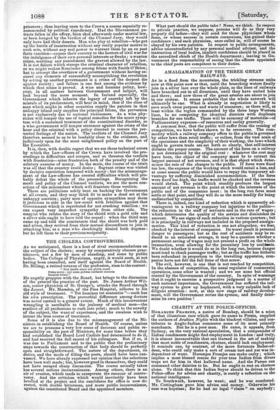THE CHOLERA CONTROVERSIES.
As we anticipated, there is a host of rival recommendations on the subject of the cholera; many by comparatively obscure prac- titioners, not a few by men of standing, and some by public bodies. The College of Physicians, angry, it would seem, at not having been consulted, sets itself against the Board of Health. Dr. Billing, a retired veteran of the profession, rises to the contest:
" Non laudis amor nec gloria cessit Patna metu : sod enim gelldus tardante senecta Sanguis hebet."
He angrily grapples with the Board, but brings to the discussion of the present the practice of the past. Dr. James Arthur Wil- son, senior physician of St. George's, attacks the Board through the Lancet. Mr. Marsden, of the Free Hospital, adheres to his old style of treatment. " Tot homines tot sententite "—each has his own prescription. The proverbial difference among doctors was never carried to a greater extent. Much of this inconvenient wrangling is ascribable to the jealousy of medical men—the readiest of all professions to rush into print; much to the novelty of the subject, the want of experience, and the emulous wish to invent the true course of treatment.
Some of it is also due to the mismanagement of the Mi- nisters in establishing the Board of Health. Of course, unless we are to presume a very low sense of decorum and public re- sponsibility on the part of Ministers for some time before they had established the Board Lord Carlisle had determined to do it, and had received the full assent of his colleagues. But if so, it was due to Parliament and to the public that the preliminary steps towards the construction of that body should be perfectly open and straightforward. The nature of the department, its duties, and the mode of filling the posts, should have been can- vassed. We have already expressed our opinion that the selections have been well made; but, however good in themselves, they could not have escaped sharp discussion. The course actually taken has several serious inconveniences. Among others, there is an air of evasion, which tends to exasperate the rancour of contro- versy. And the criticism which would inevitably have been levelled at the project and the candidates for office is now di- rected, with double bitterness, and more public inconvenience, against the constituted Board and the appointed members.
What part should the public take ? None, we think. In respect to private practice, we suppose, persons will do as they very properly did before—they will send for those physicians whose fame, or whose success in certain connexions, has gained their confidence ; and each physician, once called in, will of course be obeyed by his own patients. In respect to public arrangements, advice uncontradicted by any personal medical adviser, and the instruction of local bodies, implicit confidence should be placed in the accredited chiefs of the Health department ; leaving to Go- vernment the responsibility of seeing that the officers appointed to the chief posts are competent to their duties.


























 Previous page
Previous page